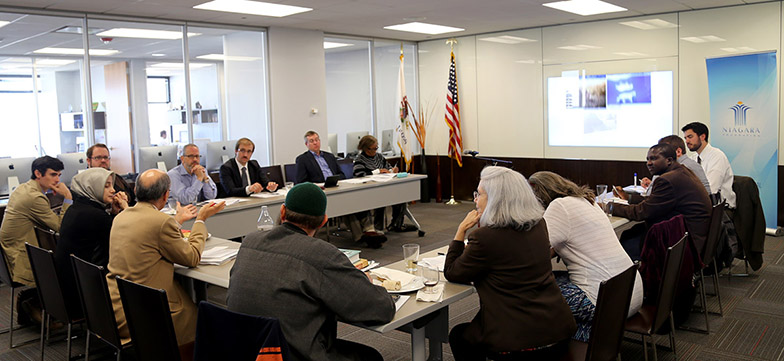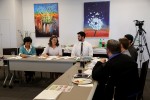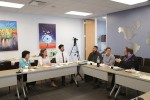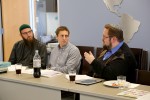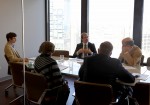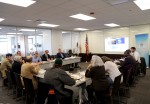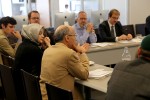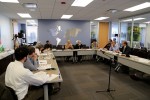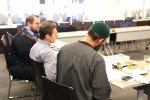Sacred Sources: God and Human Suffering
Ryan Fordice, Program Director, Center for Interfaith Engagement
Bright, mid-day sunlight flooded through the windows as the delicious aroma of Turkish food wafted through the room. Text handouts were printed and laid out, their pages filled with English, Classical Arabic, Biblical Hebrew and Koine Greek. As people filtered in – first an Orthodox rabbi, then a Presbyterian social work student, then a Sunni Muslim doctoral candidate, then a Catholic professor – conversation started, plates began to fill, and soon the much-awaited return of Sacred Sources had arrived.
The Sacred Sources program, now concluding its first year of operation, seeks to provide a safe community space for respectful exploration of sacred textual sources from the Jewish, Muslim, and Christian traditions. Niagara’s unique approach to the popular theological exercise of engaging sacred texts unfolds in three parts: eating a delicious meal together, engaging in small-group explorations of a set of passages, and gathering again as a full group to share from our small group conversations and personal insights.
Each Sacred Sources program is guided by a common story or theme. Previous sessions discussed the Joseph/Yusuf narratives and liturgical prayers across the three traditions. September’s session examined texts related to God and human suffering.
The theme and texts were selected by Professor Scott Alexander of Catholic Theological Union, Rabbi Michael Zedek of Emanuel Congregation, and Niagara staff members Ayse Arslan-Cinar and Ryan Fordice. From Islamic sources, they selected two Quranic verses on the prophet Ayub/Job (PBUH) and the prayer of the Prophet Muhammed (PBUH) upon his violent rejection by the people of Ta’if. From Jewish sources, they selected two passages from the Book of Job, as well as excerpts on suffering from Midrash and Talmudic sources. From Christian sources, they selected Jesus’ instruction that those who wish to become his followers must “take up [their] cross” and follow him, two sections on suffering from the letters of Paul, and a passage on the end of suffering in Revelation.
The rich collection of texts proved ample fuel for conversation. After lunch, we broke into three groups for a very full hour of small-group discussion (an hour that felt like twenty minutes!). When the full group regathered, there was much to share.
Abdul-Malik Ryan, Assistant Director for Religious Diversity and Loop Ministries at Roosevelt University, shared additional context surrounding Prophet Muhammed’s (PBUH) prayer at Ta’if. He explained to the group that in addition to being a prayer of superlative beauty and humility in itself, it was followed by an equally beautiful act of mercy when Muhammed asked God’s angels to spare the lives of those who had rejected, insulted and abused him.
Others in the group noted common tensions in the texts, with the issue of suffering being a focal point for major questions the people of each faith face about God and God’s relationship with humankind. What does the existence of suffering mean about the nature and power of God? How should people of faith respond to suffering in their own lives and the lives of others?
After a summer of headlines filled with suffering – from war, disease, and injustice the world over – this conversation about texts was imbued with significance beyond the limits of the pages discussed. As Niagara Foundation and the many friends of many faiths who joined us for Sacred Sources continue our respective work in the world, we carry the questions and the conversation with us: grateful for the time, people, place, and peace to speak as friends.
—
Niagara Foundation offers the Sacred Sources program with support from the Catholic-Muslim Studies program at Catholic Theological Union, the Chicago Board of Rabbis, and A Center of Christian-Muslim Engagement for Peace and Justice (CCME) of the Lutheran School of Theology at Chicago.

